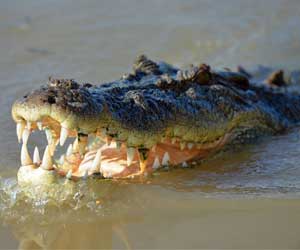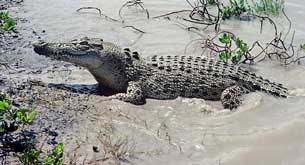Facts about Crocodiles
Posted by Franklin Jose Navarro Pabon / in Science Facts

Crocodile lurking in the water.
IMPORTANT CROCODILE FACTS
- There are 23 species of crocodiles found around the world.
- Crocodiles are cold-blooded reptiles.
- Crocodiles are meat eaters, they have 24 sharp teeth used to kill birds, fish, and mammals.
- Crocodiles art part of a group of animals which in include the gharial, caiman and alligator.
- Crocodiles and alligators are not the same.
- Crocodiles are bigger than alligators, they have a V-shape jaws, while alligators have U-shape jaws.
- Besides alligators, gharials and caimans, birds and dinosaurs are the closet relatives of the crocodiles.
- The largest crocodile species in the World is the saltwater crocodile which can reach 12-18 feet in length and weigh up to 2000 pounds.
- The smallest crocodile species in the Dwarf Crocodile with 5 feet in length and 40 pounds in weight.
- According to National Geographic, the largest population of crocodiles in America can be found in the Dominican Republic, at a lake called Enriquillo.
- Crocodiles have excellent eyesight, especially at night.
- Crocodiles are unable to chew their food, they swallow big chunks of it, sometimes they swallow rocks to help the grinding process.
- When a crocodile loses a tooth it is quickly replaced, in a lifetime crocodiles can go through 8000 teeth.
- Crocodiles cry when they are eating due to air getting in touch with lachrymal glands. Hence the expression "cry crocodile tears"
- They have the strongest bite in the animal kingdom, the muscles use to close the mouth are significantly stronger than the muscles used to open the mouth.
- A crocodile jaw can apply 5000 pounds of pressure per square inch. A human jaw only applies 100 pounds.
- Oddly, people can keep a crocodiles mouth shut with their bare hand.
- Crocodiles mate during moon season, a female can lay between 20 and 80 eggs and takes care of them for three months.
- The temperature of the nest will determine the gender of the baby crocodiles. A temperature of 31.6 Celsius will generally produce Males, while temperatures below and above 31.6 will produce Females.
- Several predators like hyenas, lizards, fish and other Crocodiles will eat 99% of newborn baby crocodiles.
- A crocodile life spawn can be between 50-60 years in the wild. However, there has been some of them reaching 80 years.

Saltwater crocodiles are not only the largest crocodiles, they are the largest reptiles on Earth.
INTERESTING CROCODILE FACTS
- Crocodiles open their jaws to cool themselves because they don't have sweat glands.
- The skin on the back of the Crocodile can be bulletproof due to the osteoderm covering, however, the skin in the belly is very gentle.
- During periods of drought or low-temperature winter seasons crocodiles will hibernate.
- Crocodiles have salt glands on their tongues, allowing them to tolerate living in salt water, but their cousin Alligators and Caimans have lost this ability and are forced to live in freshwater.
- Crocodiles have a very keen hearing. It is said that it is so good, they can hear their babies calling from inside the eggs.
- Crocodiles are incredibly fast swimmers at a whopping 20mph. On land, however, they are not as fast, running up to 11mph.
- They can hold their breath underwater for about an hour.
- The Cuban Crocodile is one of the most endangered species in the world with an estimated population of only 4000.
- The American Crocodile is also on the endangered list, however, its population is growing again.
- It is illegal to hunt crocodiles for their skin.
